[Translated][Interview] Women’s Dystopia in Korean Literature: A Conversation with Author Amil
2025-08-11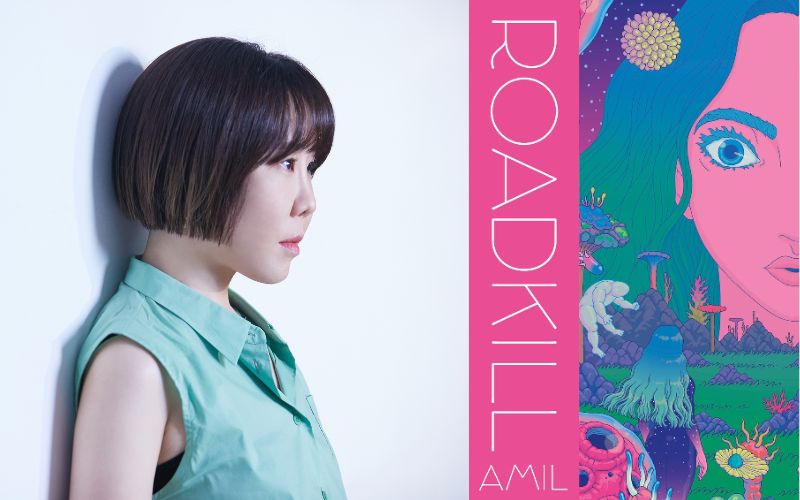
Amil is a Korean fiction writer, translator, and essayist. She publishes her fiction under the pen name Amil, while using her real name, Kim Ji-hyun, for her translation work from English into Korean.
In her stories, Amil blends reality with fantasy, blurring the lines between the two. She often takes real social issues and layers them with imaginative, compelling elements that draw readers into her worlds.
She won multiple literary awards, including the Excellence Award for Medium and Short Fiction at the 2018 Korean Science Fiction Awards for her short story Roadkill, and the Grand Prize in the same category in 2020 for Rabi.
Amil’s work has attracted attention both in Korea and abroad for its originality and unique voice. Most recently, on August 7, UK publisher Harvill Secker released the English translation of her short story collection Roadkill.
Set in a dystopian, women-centered world, Roadkill intertwines science fiction and fantasy to tell six thought-provoking stories that explore themes of womanhood and identity through vivid and imaginative narratives.
An interview was conducted with Amil to talk about Roadkill, her career, and the artistic vision that drives her work.
The interview was conducted via Gmail on August 9. The following are excerpts from it.
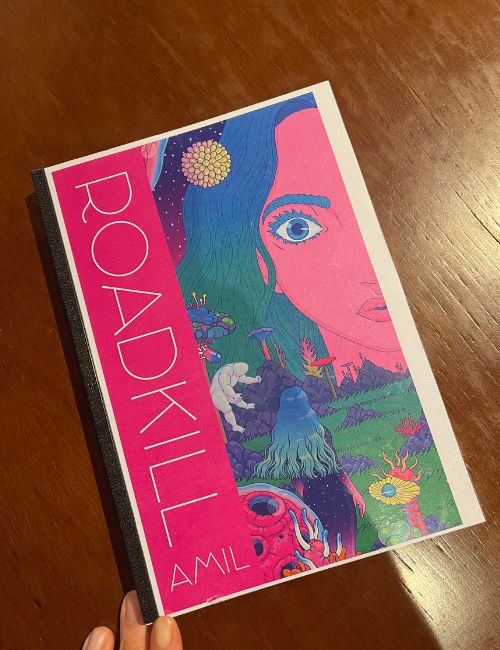
Could you tell us more about your beginnings? What motivated you to join the literary scene? And what is the meaning behind your pen name, Amil, and why did you choose it?
Ever since I was little, I loved reading, writing, and creating stories. Becoming a writer was one of my childhood aspirations, and it was a natural progression for me. The desire to create was so strong that I couldn't live without pursuing it. I made my pen name, Amil, by pronouncing the Chinese character 我密 in Korean. It can mean "my ego is dense" or "I am secretive."
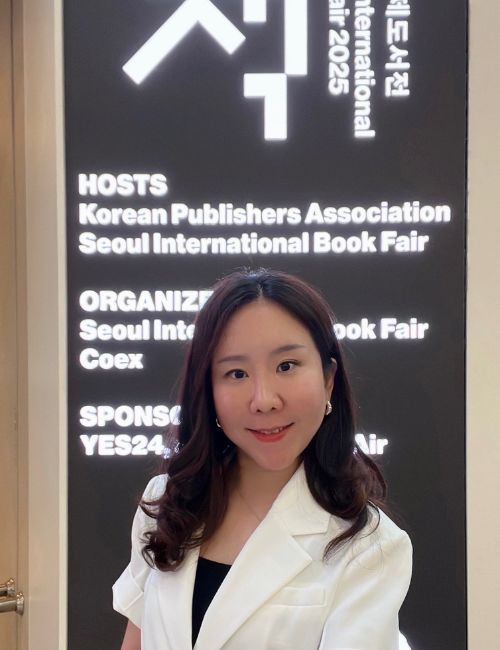
Could you tell us more about your short story collection “ROADKILL” writing process? How did you come up with the idea, and which stories from it do you prefer or think are the main ones?
I didn't plan to include the stories of "Roadkill" in one book; rather, the stories were published at different intervals in various magazines and collections. However, when I put them together, I felt they all had a common theme.
Among the stories in the collection are what I call the Escape Trilogy: "Roadkill," "Rabi," and "Sacrifice." These three stories revolve around girls in trouble who attempt to escape in different ways and with different endings. This theme was the most appealing to me while writing, so I consider them the main stories in the collection.
Your stories in this collection happen in a future dystopian world for women. However, it still clicks with many problems that women are already facing. How do you balance between imagination and representing the facts and society problems in your work?
Fantasy always begins with reality for me — I don’t separate the two in my stories. Roadkill came from something I saw online: a meme that men were sharing about women being hit by cars while crossing the street. They used the word borani, a mix of gorani (deer) and a sexual slur, to depict women as mindless animals. I was shocked by how casually they equated women with animals as an insult. That’s when I decided to write a story that combined a woman’s and an animal’s strength. In my work, the fantasy is never just fantasy; it’s rooted in real issues.
How do you build your characters, and do you usually come up with the plot first or the characters? Share with us significant moments you had during the creation of ROADKILL characters.
I usually start with the plot. First, I come up with the idea, then develop the plot, and then create the characters that fit that plot.
I can't recall a specific moment or situation during the creation of Roadkill’s characters. But I do remember putting in a lot of effort to make Rabi's character strong and real.
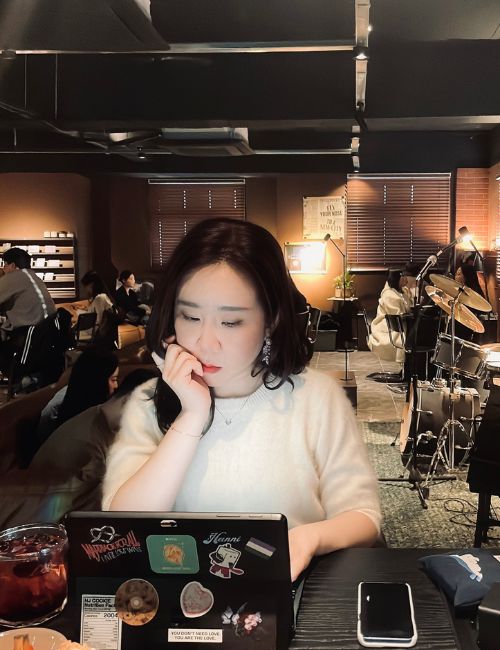
What draws you more to short stories and novellas rather than long novels? And do you think there are differences in the writing process between them?
enjoy writing novels, and I think they have their own charm. I think the appeal of novels lies in the fact that you can't completely predict where the story will go.
Of course, I always have a solid structure when I start writing a novel, but even so, as I write, elements that deviate from the original structure emerge. This makes me feel like I'm not writing the story, but the story is leading me.
However, short stories and medium-length novels are much more manageable. They're like meticulously building Lego blocks according to instructions. Also, they are more open to experimental methods.
How do you balance writing fiction, non-fiction works, and translation? And what do you prioritize among the 3 of them?
I think I can't really balance them. I just organize my time according to the current circumstances and deadlines. But since I classify myself as a novelist, writing novels and stories has priority. However, sometimes when I'm working on more than one project at the same time, I neglect writing novels a bit.
Among your original works and the ones you translated, what do you feel represents you the most and why?
It’s hard to choose just one because each character reflects a different side of me. But if I had to pick, I’d go with Rabi. She’s a storyteller, like me, and the story explores the lies writers weave to tell their stories, a theme that mirrors my own ethical questions as an author.
Author Amil’s experience highlights the close connection between literature and reality. Art is an honest expression of the problems that face humans, and imagination allows us to vent our feelings and anger, giving us the necessary strength to change.
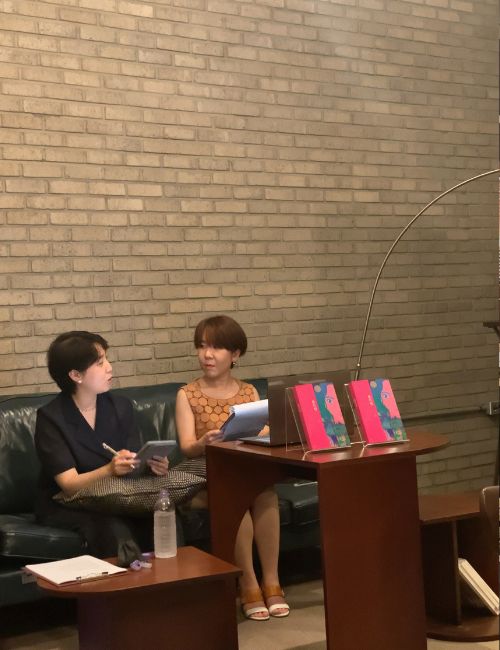
How much does the readers' and critics' feedback matter to you? Is there any specific feedback or advice that affected your career or style?
Their feedback matters; it adds new layers of meaning to my work, but I don’t change my writing style based on others’ opinions. Sometimes I consider editors’ or fellow writers’ notes, but I try not to pay too much attention to critics or readers while writing, as it could undermine my confidence. Still, praise makes me happy and keeps me going, and negative comments can hurt me even when I try to forget them.
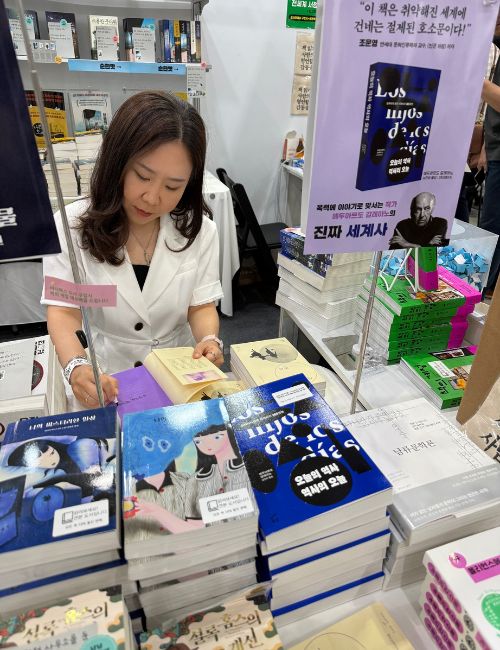
What messages are you trying to convey through your work? and do you think art can contribute to changing society?
The messages I try to convey vary from one work to another, so it's hard to summarize them all at once. Also, I don't believe art can change society, but it gives us the power and desire to continue living, and that power can help us change.
In your opinion, how did the women's status change in Korean society over the years, and what problems are they still facing, especially writers and artists?
The situation has improved significantly compared to the past; women’s employment rates have risen, gender equality laws have been updated and expanded, and feminism has become more widespread. Still, some of the old problems remain.
For example, female writers and artists often face harassment and negative comments about their appearance when promoting their work, which can make them hesitant to express themselves openly. Also, in academic and institutional circles related to literature and art, women still face obstacles to equal advancement and promotion.
What are your upcoming plans?
This month, my second short story collection, How Melon Came to Be, will be published in Korea. Next year, the English translation of my novel The Forest Called You and my short story A Butch’s Review of a Sex Robot are set to be released.
Keywords:
Amil, Roadkill, Korean literature, Short Story, Korea Net, Republic of Korea
How about this article?
- Like3
- Support0
- Amazing2
- Sad0
- Curious0
- Insightful0


